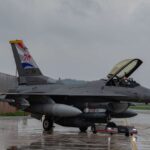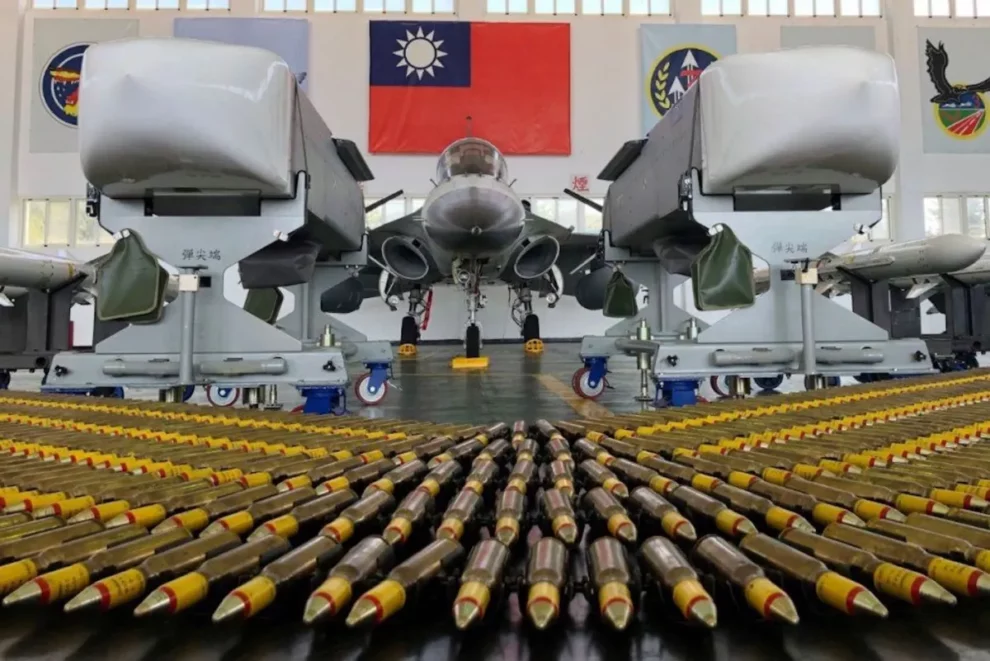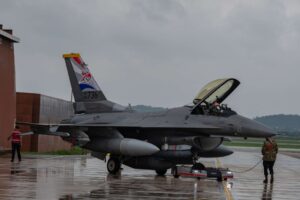Defense contractors from the U.S. and Taiwan will resume in-person conversations next month to discuss possibilities of co-producing weapons, a move likely to ignite protests from China.
The meeting, a regular event derailed by the outbreak of COVID-19 in January 2020, comes during the ongoing Ukraine crisis and increasing tension in the Taiwan Strait.
The Taiwan-US Defense Industry Forum will meet on May 3 in Taipei, with a focus on co-production, integrating Taiwan’s industrial capabilities, and a range of defense cooperation issues, according to the U.S. Taiwan Business Council, or USTBC.
Rupert Hammond-Chambers, USTBC president, told VOA Mandarin on Monday in a telephone interview that topics on the agenda include post-purchase weapons delivery and research and development of future weapons. “Of course, the possibility that at some point in time, American weapons would be produced on the island under license,” he noted.
About 25 U.S. defense contractors are expected to send representatives to Taiwan, according to USTBC.
Hammond-Chambers told Nikkei Asia that Taiwan is interested in the co-production of airborne, surface and subsea drones, as well as ammunition. Several American defense contractors specializing in drone technology are scheduled to participate in the Taiwan trip.
The Chinese Embassy in Washington did not reply to a request for comment made by VOA Mandarin.
Government approval
U.S. defense manufacturers typically need government approval before they can jointly produce weapons with overseas partners, and according to a Congressional Research Service report updated on March 23, the companies must apply for a Global Comprehensive Export Authorization before they are allowed to partner with “NATO countries, Australia, Japan, and/or Sweden for major defense article programs.” Taiwan is not mentioned in connection with the program.
Jordan Cohen, a defense and foreign policy analyst at the Cato Institute, told VOA Mandarin the U.S. government usually errs on the side of caution when deciding whether to endorse weapon co-production with international partners.
“Historically there has been opposition in the U.S. government, both because this type of intelligence sharing puts secret information at risk, and because it reduces price offsets, which means the U.S. will see less of the profit re-enter its own economy,” he told VOA Mandarin via email on April 14.
Randall Schriver, chairman of the board of the Project 2049 Institute and a former assistant secretary of defense for Indo-Pacific security affairs, agreed.
“Co-production is a good idea to explore, depending on the sensitivity of what’s being proposed for joint production,” he told VOA Mandarin. “If the U.S. government is supportive, there’s still the issue of commercial interests. So, our defense industry has some say in this.”
He added that one of the issues with producing weapons in Taiwan is the lack of a third-party market, “because countries won’t necessarily want to buy from Taiwan, or something produced in Taiwan.”
Eric Gomez, a senior fellow at the Cato Institute with a research focus on the U.S. military budget and force posture, told VOA Mandarin in a phone interview on April 14 the U.S. likely will worry that China can easily steal sensitive information should the production happen in Taiwan. Force posture is the overall military disposition, strength, and condition of military readiness, according to the U.S. Defense Department.
“I think it’s a good bet that China probably has intelligence assets in Taiwan that can gather information on a weapon system and get them back to China,” he said. “It’s relatively easy for movement between the two, it’s relatively easy to have that level of penetration because there’s a lot of similarities between the two.”
Hammond-Chambers of USTBC suggested there will be a number of major criteria in assessing whether it makes sense to co-produce any given weapon with Taiwan.
He said the government needs to look at its overall policy and ask questions, such as whether the product fits America’s strategy, how advanced the technology is, and if it’s old technology versus new, with increased sensitivities about releasing new tech to a foreign source.
He pointed out that Taiwan has built up some credibility in safeguarding American technology.
“There’s always a concern when you license technology outside of your own company, but I would point out that Taiwan does have some American technology and has [purchased] a bunch of American weapons. In the commercial economy, companies like TSMC [Taiwan Semiconductor Manufacturing Company] produce other people’s technology every day and people trust them to do that without concern of the PRC stealing that technology,” Hammond-Chambers told VOA Mandarin.
“So, Taiwan has built up considerable trust over the years as a trustworthy partner in producing with other people’s technology.”
China’s government-affiliated Global Times published an editorial on April 12 after Nikkei Asia reported the upcoming trip by U.S. defense contractors, saying that if the U.S. builds weapon production lines in Taiwan, it will further escalate tensions in the already tense U.S.-China relationship.
“That would be even worse than selling arms to Taiwan,” the editorial said.
“Apart from necessary sanctions, the People’s Liberation Army will target these kinds of facilities. It will be another target for our missiles.”
Gomez from the Cato Institute said the U.S. needs to keep a low profile if it opts to proceed with co-production with Taiwan.
He said that if Congress and the White House are very vocal about a potential deal, then China will be more likely to respond in a big way.
“I would suggest doing it quietly without making too big a deal of it in public,” Gomez said, “I think the practical benefit of it … is very real.”
Source: Voa News
















